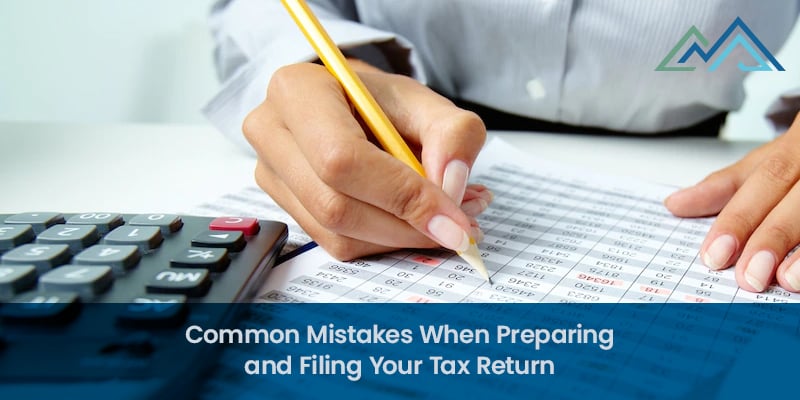Originally Published on Feb 29, 2016. Updated on Dec. 7, 2022.
As 2022 comes to a close and the new year is about to turn over, taxpayers will start to receive tax documents like W-2s and 1099s, reminding them that they need to file their tax returns soon.
In my years of preparing tax returns of all types, I've put together a list of common mistakes that can be avoided with a little extra time and attention.

1. Failure to Verify the Correct Name, Social Security Number, and Date of Birth
This may seem obvious, but it is one of the top errors when filing with the IRS. Take the extra time to check that all names are spelled correctly, that the social security number is accurate for each person, and that the date of birth is correct. Do this after the tax return is ready to be mailed or e-filed – sometimes, you can bump a key when cycling through input screens (when using tax software) and change a social security number by accident.2. Incorrect Direct Deposit Information
If you are going to receive a refund, you can deposit that amount directly into your bank account. This is a more secure method and typically a faster method to receive your refund compared to a paper check. However, if you have the wrong account or routing number, you could lose your refund entirely. It could end up in someone else's account or it could be sent back to the IRS. Either way, you might be unable to retrieve your refund because there is no IRS procedure for replacing lost electronically transferred funds. Take the extra time to double-check your account number and routing number.
3. Failure to Report All Income
Did you bring in extra income that was not reported/reportable on a W-2? You may have received a Form 1099-NEC, but even if you didn’t, it is important to report it. By not reporting that income, you may leave the statute of limitations open – meaning the IRS can go back as many years as they need to open an audit. When a tax form such as a 1099 (INT, DIV, NEC, R, etc.), W-2, and others are issued to you, that information is sent to the IRS. The IRS will know exactly how much money you earned. If you forget to include any of these earnings on your return, the IRS examiners will let you know you owe taxes on them. And depending on when your oversight is discovered, you also could owe penalties and interest on the unreported earnings.
4. Failure to Take Tax Credits and Deductions
There are so many different tax credits and deductions that may be available to you. Deductions and credits can greatly reduce or eliminate your tax burden. These credits and deductions cannot be addressed here - The tax code covers 18,500 pages! Everyone’s tax situation is different because everyone’s life is different. There are times where simple tax questions may be searched and answered online. Use caution when doing this. My disclaimer: Please consult your tax advisor.
2. Roth IRA Conversions
5. Complete charitable contributions
Did you make charitable contributions of cash or property? All types of donations, from cash to cars, could be valuable tax deductions. You need to make sure you count them all when you file. When you donate, get the tax information you will need at the time of the donation, such as the name, address, and tax identification numbers of the organization, the value of the donation, and the date. Also, be careful when calculating the value of any gifts of clothing and household items – use a thrift store value or similar. Lastly, do not claim a donation of more than $5,000 without an official appraisal.6. Incomplete/Missing Documentation
Always have complete documentation for any position you take on a tax return. Meaning, if you are claiming charitable deductions, have the documentation of the donation. If you have expenses that you are claiming from unreimbursed business expenses, have proof of the expenses. You never know when the IRS may select you, and your return is flagged. It is even more difficult to find documentation for an expense three years after the fact than it is when you are assembling your tax return. Gather your documentation when you prepare and keep it with the return.
7. Failure to make a copy of the signed return and all schedules
Before mailing or e-filing your return, print it, sign it, and then put it with your important papers. I also recommend scanning and saving it with your other important electronic files. By keeping a complete copy of your tax returns, you accomplish a few things:
1) You know exactly what was filed with the IRS, so if they lose it, you have an exact copy.
2) If you need to apply for a loan, you will have a copy ready.
3) You can compare your current tax return to prior years and see how you are doing. Also, if you decide to begin using a CPA firm or paid tax preparer, they can make sure any carryovers (losses, etc.) are still accounted for and not lost in the transition.

















